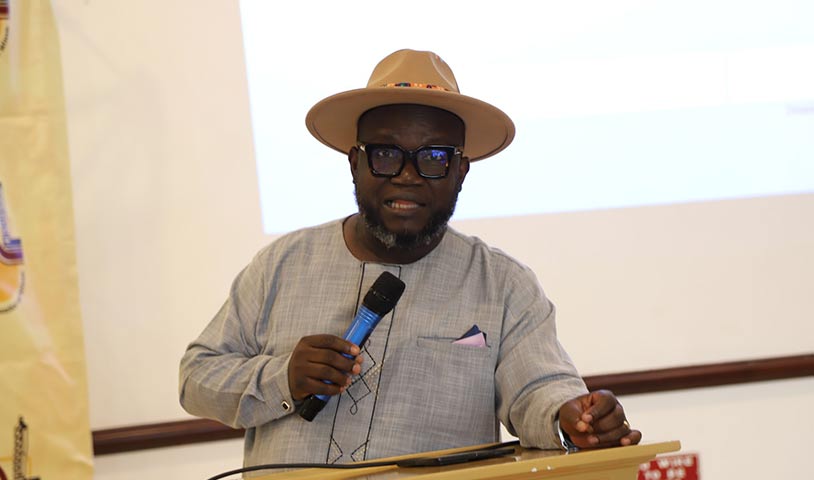The Ghana Chamber of Mines launched its annual Sustainability Month at the Lancaster City Hotel in Kumasi, marking yet another milestone in the industry’s quest to balance economic growth with environmental stewardship and social responsibility.
The event, graced by members of the Chamber and industry leaders was led by the Chief Executive Officer of the Ghana Chamber of Mines, Ing. Dr. Kenneth Ashigbey, who delivered a compelling call for responsible mining.
“Mining has been the backbone of Ghana’s economy for over a century,” he noted.
“But we are judged, not by ounces extracted, but by the quality of lives transformed.”
Mining and Ghana’s Economy
Addressing the people, Dr. Ashigbey acknowledged that while mining has long driven Ghana’s economy, its success should no longer be measured solely by production or export figures.
Instead, he urged industry stakeholders to adopt a broader view that factors in sustainability, human development, and ecological preservation.
Over the past decade (2014–2023), Ghana’s total mineral revenue exceeded USD40.15 billion, with more than USD29 billion reinvested into the country’s financial system via the Bank of Ghana and commercial banks.
In addition, more than USD220 million was channeled into corporate social responsibility projects.
In 2024 alone, the sector contributed GH₵17.7 billion in fiscal payments, a 51.2% increase compared to 2023. Dividends paid to the state surged by more than 600%, rising to GH₵1.03 billion. Mineral royalties also climbed by nearly 77%, from GH₵2.8 billion to GH₵4.9 billion.
“These are not just economic figures,” Dr. Ashigbey remarked. “They represent positive impact of responsible mineral wealth management, a catalyst for national development and a source of pride for the industry.” Standards
The Chamber has positioned sustainability not as a peripheral activity but as the foundation of its operations. Globally, businesses are increasingly judged by their Environmental, Social, and Governance (ESG) standards, and Ghana’s mining industry is no exception.
Dr. Ashigbey outlined the Chamber’s ESG commitments to Environment – Investments in clean energy, efficient waste management, and reduced carbon footprints. Social – Stronger emphasis on safety, inclusivity, human rights, and community development. Governance – Enhanced collaboration with regulators to ensure fair, transparent, and equitable benefit-sharing.
“The world was not given to us by our parents; it was lent to us by our children,” he reminded the audience, citing an African proverb. “Our task is to safeguard transgenerational equity, ensuring that the benefits of mining today do not come at the expense of future generations.”
Artisanal And Small-Scale Mining
He also touched on the pressing issue of artisanal and small-scale mining (ASM). While ASM provides livelihoods to thousands, its informal and often unsafe practices can harm the environment.
Dr. Ashigbey stressed the need to bring ASM operations into a sustainable framework aligned with national and global environmental goals.
The Theme “Mining Responsibly, Sustaining the Future”, he said encapsulates the dual mandate facing the industry: balancing short-term economic benefits with long-term stewardship.
“Sustainability is not an optional add-on,” Dr. Ashigbey declared. “It is how mining must be done.”
To drive this message home, the Chamber has designed a month-long programme filled with practical, educational, and community-based initiatives.
October Highlights
The activities planned for October seek to create awareness while showcasing mining’s contributions beyond the extraction of minerals.
They include: press launch & campaign rollout supported by member companies, radio and TV interviews to expand the sustainability conversation nationwide, digital and social media campaigns aimed at engaging Ghana’s younger population and industry webinar to deepen stakeholder understanding of ESG principles.
The rest are community-based projects, including tree planting, clean-up campaigns, and alternative livelihood programmes, school outreach initiatives in mining communities to instil sustainability values in the next generation and media engagement sessions to evaluate progress and set the future agenda.
Through these initiatives, the Chamber hopes to “walk the talk,” reinforcing the idea that sustainability is more than rhetoric, it is practice.
Citing the late Kofi Annan, former UN Secretary-General, Dr. Ashigbey reminded stakeholders that development, security, and human rights are interdependent.
“We will not enjoy development without security, we will not enjoy security without development, and we will not enjoy either without respect for human rights,” he quoted.
This perspective, he argued, mirrors the essence of Sustainability Month: ensuring that mining advances human dignity while securing economic prosperity and ecological balance.
Collaborated Effort
Dr. Ashigbey emphasized that the sustainability journey cannot be pursued by the mining industry alone. Governments, communities, civil society, and small-scale miners must all play a role.
“Together, we can build a mining ecosystem that is not only profitable but also principled; not only productive but protective of the environment and society,” he said.
He urged all stakeholders to embrace the shared mission: “Let us mine responsibly, farm sustainably, and grow resiliently so that we can truly sustain the future.”
The Chamber’s renewed emphasis on sustainability comes at a critical time for Ghana’s economy. While mining remains the largest source of foreign exchange, concerns about environmental degradation and community displacement persist. Initiatives like Sustainability Month help position the industry not only as an economic engine but as a partner in social and ecological development.
If effectively implemented, the Chamber’s ESG agenda could serve as a blueprint for balancing extractive industries with long-term national development—a model worth replicating across Africa.


